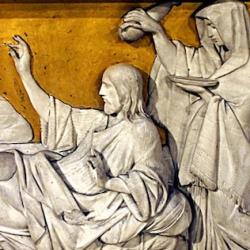Jesus’ parable of two brothers (Matthew 21:28-29) is puzzling on several levels. There is a major textual variant; the NKJV, following one tradition, puts the defiant-but-remorseful brother first and the NASB puts the compliant-but-disobedient brother first. We can address the textual question, I think, when we have figured out the other puzzle: What is Jesus getting at? How does the parable fit into the discussion of John’s ministry, Pharisees, tax collectors and prostitutes, the kingdom of God?
Our instinct is to match the two brothers with the two groups that Jesus mentions, but it’s hard to make them match. If the context is John’s ministry (v. 32), then the parable implies that the “sinners” originally refused and the Pharisees initially accepted John. That’s not the way Matthew told the story earlier; the only time John speaks to Pharisees he denounces them as a brood of vipers (Matthew 3:1-12), and there’s no indication that outcasts initially greeted John with skepticism. It rather seems that the Pharisees both initially refused and continued to disobey, while the tax gatherers and prostitutes initially accepted and persisted in faith.
That, according to a CBQ article (1996) by Wendell Langley, is the key to the parable: the excluded options of total disobedience and total obedience.
Jesus is setting a trap, as He did with His question about John’s baptism and as He does with the parable of the vineyard. After all, neither brother is truly obedient. A son who refuses his father to his face has broken the fifth commandment, and has all but “cursed” him – taking him “lightly” ( qalal ) instead of taking him and his words weightily ( kabed ; cf. Exodus 21:15-17). That son’s behavior would have been shocking. Yet the other son clearly did not do his father’s will either. He doesn’t curse him to his face, but he certainly doesn’t put any weight on his father’s words either.
This is the trap: The Pharisees can’t say that either son was fully obedient, fully honoring his father. But they take the bait and offer a choice, and this leaves Jesus with an opening for a qal wahomer (how much more) argument. As Langley says, “Jesus presents a situation in which each son is partly obedient, partly disobedient, and neither is totally obedient, totally disobedient. Thus Jesus grounds his use of the qal wahomer , for if we admit that, by implication, either son failed to do the will of the father (though each is obedient on one of two accounts), how much more so a son who is disobedient on both accounts. Jesus is left free to dog his adversaries, whichever way they jump.”
That is: If they admit that the compliant-but-disobedient son was right, then Jesus can say, “Why didn’t you accept John?” If they say that the defiant-but-remorseful brother was right, then Jesus can ask, as He does, “Why didn’t you feel any remorse? If he was the righteous son, why did you not repent eventually?” (v. 32). Either way, Jesus can say, “You should have been more like that son, then. But in fact, you both refused to your father’s face and also persisted in disobedience. How much more disobedient then are you than they.” They could reject the analogy, arguing that John is not speaking for the Father, but that puts them back in the same dilemma they were in earlier (vv. 24-27).
Meanwhile, the tax gatherers and sinners took John as a prophet from the beginning (v. 26), and have listened to Jesus as well. If the Pharisees say, “Neither son was obedient. An obedient son both agrees to work and also does the work,” they will be implicitly endorsing the behavior of the tax gatherers and sinners. Which they don’t want to do.
Langley argues that this interpretation of the parable doesn’t depend on the order of the brothers, which is true. But it may give a hint about how they match up. The Pharisees, it seems, are more like the defiant brother; Jesus treats them as such in verse 32, but says they are even worse because they didn’t become remorseful and go. When they endorse the behavior of the defiant-but-obedient brother, they are condemning themselves because they didn’t turn from their initial refusal in order to follow John, which would mean following Jesus.
Sons and fathers evoke the situation of Israel, and this is perhaps, like the following parable of the vineyard, an allegory of Israel’s history as well as an allegory of the responses to John’s ministry. Israel is here divided in two, or perhaps it’s a hint that God has both a Jewish and a Gentile son. One son agrees to keep covenant, but fails; this is the Israel that accepted the covenant of Sinai but didn’t didn’t do what it required. The other son refuses and defies God to His face, but eventually turns to Him; perhaps Gentiles. Perhaps too Jesus is drawing on the history of Israel and Judah, the two royal “sons” of Yahweh.











